The Surreal Story of Asa Carter
The Alabama ‘virulent racist’ who wrote George Wallace’s most infamous speech also wrote “The Outlaw Josey Wales” and the “True story: The Education of Little Tree.” (The story wasn't true).
Thundered Wallace: “In the name of the greatest people that ever tread the earth, I draw the line in the dust and toss the gauntlet before the feet of tyranny. And I say: Segregation now! Segregation tomorrow! Segregation forever!"
***
The above words were spoken by newly-elected Alabama governor George Wallace in January 1963 at Wallace’s Inaugural Address.
As author Allen Barra noted in a 2001 article for salon.com, “Wallace's national reputation was made.”
What most people probably don’t realize is that Wallace didn’t write the sentences that still largely define how most Americans remember the four-term governor who would later become a serious candidate for U.S. president.
The words were written by a “secret” speech writer Wallace had used in his gubernatorial campaign, a man named Asa Earl Carter.
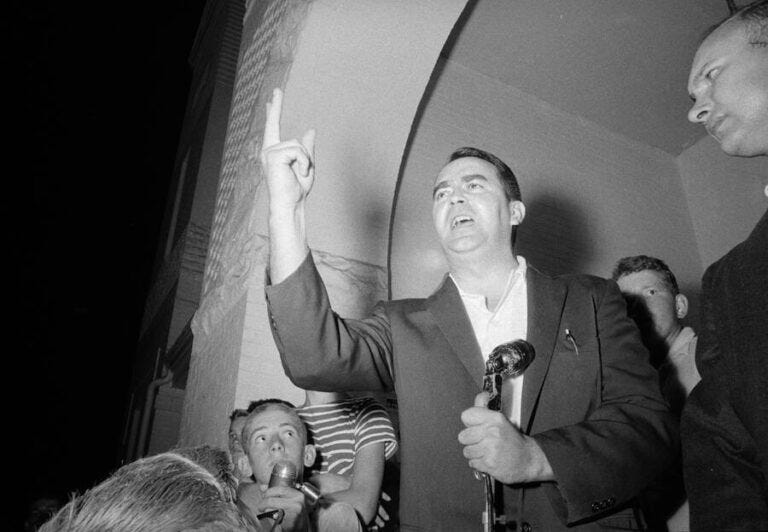
As many Alabamians already knew at the time, Carter was a virulent segregationist, former Ku Klux Klan leader and an extreme racist.
What most people don’t know to this day is that Carter left Alabama, dramatically changed his appearance, “re-invented himself” with a new first name (Forrest) and became the author of two of the most culturally-significant novels of recent decades - the novel that was adapted into the iconic Clint Eastwood film “The Outlaw Josey Wales” and the “New-Age, publishing phenomenon,” The Education of Little Tree, which, by 2001, had sold more than 1.44 million copies.
The surreal back story of Asa Carter has always fascinated me and might even be germane to political and censorship trends today as Carter’s story has been cited by at least one influential historian as a warning that “fascists” like Tucker Carlson and supporters of President Trump are emulating rhetoric once espoused by Carter and Wallace.
The rest of this surreal story …
From a variety of sources (see below), I was able to identify the bizarre elements of Asa Carter’s strange and mysterious life.
After serving in the Pacific Theater in the U.S. Navy in WWII, the native of Oxford, Alabama attended the University of Colorado in Boulder before returning to his home state, where he became well-known in Birmingham as a passionate segregationist who could spread his white-supremacy and anti-communist views on a radio program that was syndicated to 20 stations.
Feeling that the KKK wasn’t strident enough, he founded a “splinter group” of the Klan known as The Original Ku Klux Klan of the Confederacy and was founder of “a monthly publication titled The Southerner, which spread white supremacist and anti-communist rhetoric.” Carter also formed a group called the White Citizens Council.
The future speech writer for George Wallace and celebrated novelist was also a political candidate himself. From 1958 to 1970, he ran for director of the Pubic Safety Commission in Birmingham, for Alabama Lt. Governor and, in 1970, against Wallace as a candidate for governor.
To Barra and others, Carter’s paltry voting numbers prove that Carter’s views on race were far too extreme for even Alabama voters of the time. And while Carter wrote George Wallace’s most memorable speech, Wallace and key figures in his inner circle soon distanced themselves from the far-more inflammatory Carter (who they gave the nickname “Ace.”)
(Per journalist Allen Barra, Wallace “always denied” he’d ever met Asa Carter. Any speeches Carter wrote for Wallace were “indirectly” given to Wallace by aides who surreptitiously worked with Carter. However, other writers say Wallace did know Asa Carter).
Carter’s followers commit one ghastly crime …
While Carter was never implicated with personally committing violence among blacks or ordering violence against minorities, his followers were.
In 1956, backers of Carter’s KKK organization reportedly “attacked” Nat King Cole at a Birmingham concert (Nat King Cole was originally from Montgomery).
On his radio show, Carter had called for the boycott of any music by black rock and roll artists.
“Carter was quoted by United Press International as saying that the NAACP had "infiltrated" Southern white teenagers with "immoral" rock and roll records. Carter called for jukebox owners to purge all records by black performers from jukeboxes.”
Even more revolting, In September 1957, “six members of Carter's Klan group abducted and attacked a black handyman named Judge Edward Aaron. They castrated Aaron, poured turpentine on his wounds, and left him abandoned in the trunk of a car near Springdale, Alabama. Police found Aaron, near death from blood loss.
“Carter was not with the men who carried out this attack. Four of the six involved were convicted of mayhem and sentenced to 20 years, but in 1963 … a parole board commuted their sentences.”
Journalist and author Barra, who grew up in Birmingham, found a pamphlet from Carter’s 1970 gubernatorial campaign where Carter warned white Alabamians about the prospect of black policemen:
"Soon, you can expect your wife or daughter to be pulled over to the side of the road by one of these Ubangi or Watusi tribesmen wearing the badge of Anglo-Saxon law enforcement and toting a gun... but (he'll be) as uncivilized as the day his kind were found eating their kin in a jungle."
According to multiple sources, Carter was a long-time alcoholic who was prone to fly off into rages. He also had several brushes with the law.
Dan Carter, a historian originally from Alabama who would later “out” Asa Carter, told Barra, “[Asa Carter] had a long history of violence; in fact, it's not an exaggeration to call him something of a ... psychopath.”
Per Wikipedia, “In 1958, Carter quit the Klan group he had founded after shooting two members in a dispute over finances. Birmingham police filed attempted murder charges against Carter, but the charges were subsequently dropped.”
Carter, a former amateur boxer (like George Wallace), had also previously been arrested for fights.
After gaining only 1.5 percent of the vote in the 1970 Democratic primary for governor, at Wallace’s January 1971 Inauguration, Carter and some of his supporters demonstrated against the man Carter once wrote speeches for, carrying signs reading "Wallace is a bigot" and "Free our white children.”
The demonstration was the last notable public appearance by "Asa Carter.”
Asa Carter begins the ‘second act’ of his professional life
Writes journalist and author Barra: “Forrest Carter went to Texas to begin a new life -- one that was to definitively disprove F. Scott Fitzgerald's claim that there are no second acts in American life.”
In this act, Carter wouldn’t be a rabid segregationist and failed politician, but instead a serious and important novelist. He would now call himself Forrest Carter. (The new name must have been chosen in homage to the founder of the Ku Klux Klan, former Confederate general, Nathan Bedford Forrest. According to one story, one of Carter’s four children was named Nathan Bedford Forrest.)
Forrest Carter” and his then-wife first moved to Florida, where Barra writes that Carter “worked on his tan,” before the couple moved to Abilene, Texas.
Carter also grew a mustache, lost weight and began wearing cowboy hats, blue jeans and a string tie. His speech and syntax also took on a much-more “folksy speech pattern.”
(Barra, who remembered Carter from his virulent segregationist years in Alabama, later interviewed Carter just before his death in 1979. Barra wrote that the person he interviewed bore hardly any resemblance to the public figure he remembered).
According to multiple sources, Carter started highlighting his alleged Indian ancestry. (Some residents in Carters’s hometown said Carter did have ancestors who were either Cherokee or part Cherokee).
Carter also told his new neighbors he was an orphan, like the main character in his “true story” The Education of Little Tree. (Carter was NOT an orphan). Also, he started referring to his sons as his “nephews.”
While in Texas, he was often seen at the local public library doing research for his first novel, which was published in 1973 by Whipporwill Publishers under the title The Rebel Outlaw: Josey Wales.
Some accounts say the book originally sold only a small number of copies, but others say it sold moderately well. (The book was reprinted in 1975 by Delacorte Press with the new title, Gone to Texas. After the movie was a blockbuster hit, it was reprinted a third time with the same title as the famous movie.)
In the book, the main character, Josey Wales, flees Missouri and his stormy past and goes to Texas … just like the author had fled Alabama and his stormy past and … “gone to Texas.”
Carter gets his book in front of Clint Eastwood …
From Barra’s 2001 Salon article, readers learn:
“ Sometime in late 1973 Bob Daley, a producer for Clint Eastwood's Malpaso Productions in California, received a book with a note for Eastwood. "The letter spoke of Clint's 'kind eyes,’ " says Daley. "I thought, 'Who in the world thinks that Clint Eastwood has 'kind eyes'? I was curious."
Daley didn't read westerns, but he gave The Rebel Outlaw Josey Wales a try. Intrigued, he talked Clint into giving it a try; the next day Eastwood told Daley to buy it for Malpaso. Carter's cut was $25,000 for screen rights -- not bad for a first-time author writing in a pulp genre -- with an additional $10,000 if the film was made.”
Daley later met with the book’s author in Dallas.
“When Carter arrived, he was staggeringly drunk and proceeded to piss all over the office carpet,” reports Barra.
Barra also reports that the first director on the film project, Phillip Kaufman, was not comfortable with the themes of the book and wanted to seriously re-work the film version.
Barra interviewed Kaufman, who was quoted as saying:
“ 'Fascist' is an overworked word, but the first time I looked at that book that's what I thought: 'This was written by a crude fascist.' It was nutty. The man's hatred of government was insane. I felt that that element in the script needed to be severely toned down. But Clint didn't, and it was his movie."
Eastwood eventually fired Kaufman and went on to direct himself.
(Although I’ve never read the book, Eastwood’s version was apparently very faithful to Carter’s story.)
As I learned from watching a fascinating 12-minute video on the movie, one somewhat-novel feature of the book and movie is the fact it tells the story of the Civil War from the perspective of a Confederate veteran - a character whose wife had been killed and raped by federal troops and whose son had also been murdered.
The lead character was either looking for “vengeance” or was hounded by union troops and bounty hunters the rest of his life when, really, the character just wanted to be left alone and get on with his life.
(This YouTube video segment, a film historian’s treatment of the movie which also addresses Carter’s fraudulent back story, produced many provocative reader comments on the book/movie and Carter’s effort to re-invent himself).
Trying to reconcile the two Asa Carters …
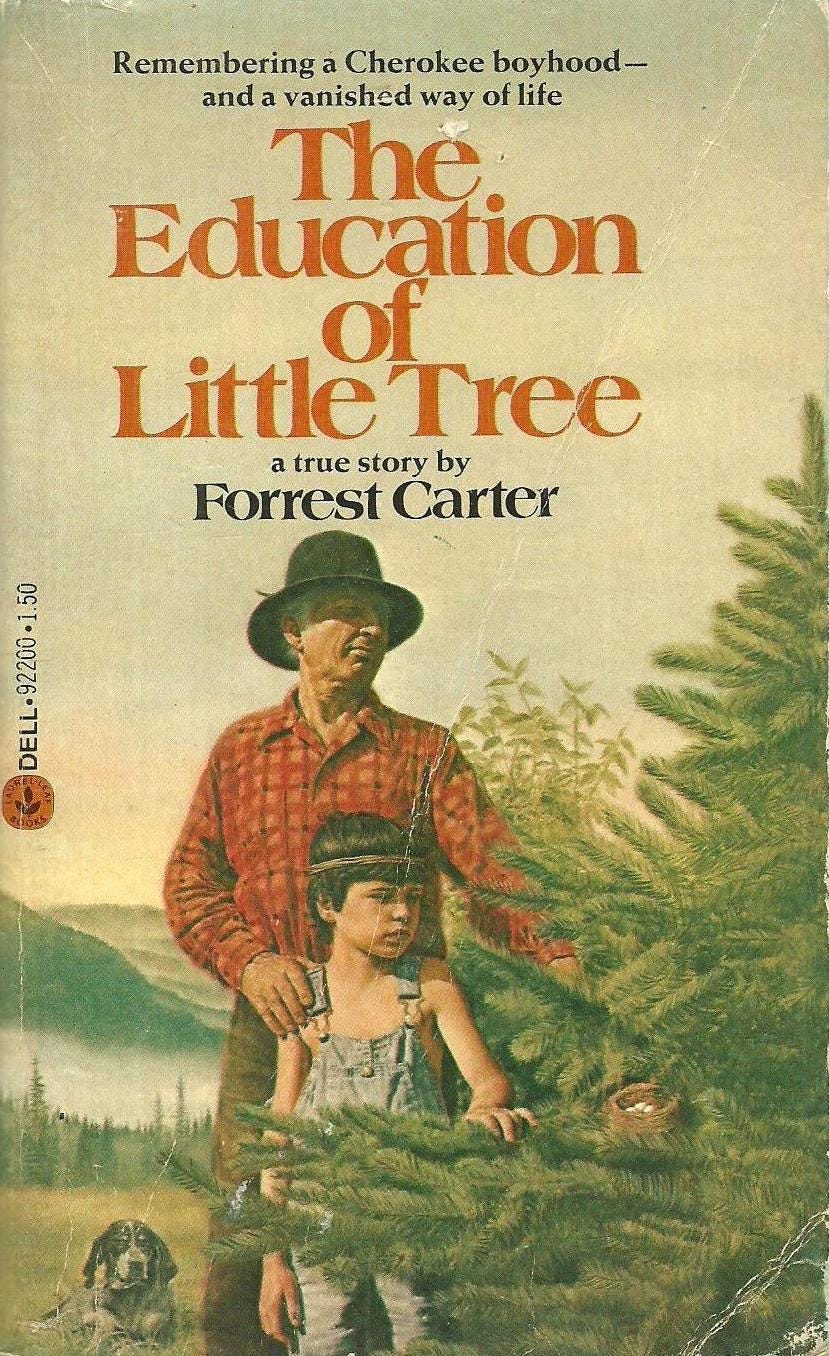
In the years since Carter’s death, many people have tried to reconcile how a man with Carter’s sordid past and personal demons could produce such outstanding, indelible works of fiction.
The critic and reader consensus seems to be that Carter’s book The Education of Little Tree is a testament to how people can change. Little Tree is widely viewed as a “New Age” treatise on tolerance, which highlights the importances of the laws of nature and the lesson that everyone should respect the natural environment.
Both Little Tree and The Outlaw Josey Wales also depict how how minorities (Native Americans) have suffered great injustice at the hands of evil and lying government.
In an introduction to later published versions of Little Tree, Rennard Strickland, a professor of law at the University of Oregon, writes that "'Little Tree' speaks to the human spirit and reaches the very depth of the human soul.”
According to Barra, the child protagonist of Little Tree continues to be viewed as “a pillar of New Age wisdom and a multicultural hero.”
However, for his part, Barra views Little Tree as an only slightly-different take on Carter’s core life philosophy, a philosophy that says authority figures should never be trusted, that such people and organizations commit great evils and should, if necessary, be fought just like the wronged “outlaw” Josey Wales fought such people and forces.
As a book summary at the website “thriftbook” notes:
“(The character) Little Tree also learns the often callous ways of white businessmen, sharecroppers, Christians, and politicians. Each vignette, whether frightening, funny, heartwarming, or sad, teaches our protagonist about life, love, nature, work, friendship, and family. A classic of its era and an enduring book for all ages, The Education of Little Tree continues to share important lessons. “
Even today, many influential figures argue that the themes espoused by the speeches Carter wrote for Wallace and his two-best known novels should be, if not directly censored, be monitored with alarm as “threats” to the establishment.
That is, when leading figures warn of the dangers of “extremist views” they can point to figures like Asa Carter as the embodiment of these societal dangers.
Carter’s true back story or “double life” was first outed by another Alabama writer (in an opinion piece published The New York Times in 1975.) Among other books, historian Dan Carter also wrote the “definitive” biography on George Wallace.
Several years ago, Dan Carter also wrote a book about Asa Carter’s double life titled Unmasking the Klansman.
The magazine Texas Monthly published a book review of Dan Carter’s book. (Note: It’s possible Asa Carter and Dan Carter are “distant cousins.”)
From Paul Stekler’s book review of December 2023:
“To dismiss Asa Carter as an awful racist from a distant past is a mistake, Dan Carter argues. The author compares Asa Carter’s rhetoric, particularly his racial “replacement” views, to Tucker Carlson’s nightly rants and to the rise of groups like the Proud Boys, and the seemingly easy acceptance of far-right rhetoric in the Trump years and even in the U.S. military.”
Carter is interviewed by Barbara Walters …
The real identify of Asa Carter might never have been exposed by Dan Carter (and also, Alabama journalist Wayne Greenhaw) if Carter had not accepted an invitation to appear on “The Today Show” in 1975 to help promote the film release of “The Outlaw Josey Wales” as well as his upcoming memoir and alleged “true story” The Education of Little Tree.
According to Barra, during the interview with show co-anchor Barbara Walters …
“(Carter) smiled, winked and squinted under the brim of his black cowboy hat, but moments after his appearance NBC was bombarded by calls from area code 205. A handful of his old cronies in Alabama had made him. Forrest Carter's days were numbered.”
Or … maybe not. In another bizarre twist to the story, even though the real Carter had been exposed (in two articles in The NY Times), this was rarely mentioned in coverage of the movie’s blockbuster success.
Nor did it prevent Carter from publishing his second novel, said to be a “true story” - The Education of Little Tree - in 1976.
Upon publication, the book had only modest sales, but when the book rights were acquired by the University of New Mexico Press in 1985 (six years after Carter’s early death at the age of 53 in 1979), it suddenly became a publishing phenomenon.
As of 2001, the book had sold 1.44 million paperback copies and 60,000 more hard-back copies.
“In 1991, 15 years after its publication and 12 years after Carter's death, Little Tree won the coveted Abby Award and, for a few weeks, was the No. 1 “non-fiction” best-seller in the country, according to The NY Times’ book list.
Later, publishers did change the genre of the book from non-fiction to “fiction” but, as Barra noted, nowhere in the introductory text or book jacket does the New Mexico Press mention that the book’s author had been exposed as a previous virulent racist or that he had been a key speech writer for George Wallace in the early 1960s - “an omission that Diane McWhorter equates to "publishing a book of Hitler's paintings without mentioning the word ‘Nazi.' "
At one point, the book, which became popular in the genres “Native American Lit” and “Juvenile Fiction,” was heartily endorsed by Oprah Winfrey’s famous book club list. However, many years later, Winfrey pulled her imprimatur when she learned the true “provenance” of the author.
Also, according to multiple sources, Steven Spielberg was once interested in making the book into a movie, but nixed the project when the author’s past resurfaced.
For his part, before his death, Asa Carter never admitted that he was … Asa Carter from Alabama. When he was buried in his home town in 1979, his grave marker had the name Forrest Carter. However, 10 years later, family members changed the marker’s name to “Asa Earl Carter.”
Carter’s death was as strange and mysterious as his life …
While Carter’s death certificate says he died of a heart failure, Barra and other journalists, citing the EMT who responded to the death call, have reported that Carter apparently (or likely) died from asphyxiation on his own vomit after being involved in a drunken fight with his son.
Carter was 53 at the time of his death, although he seemed to have aged by at least a decade since his real identify had been exposed by the New York Times and others.
Carter’s heavy drinking apparently grew worse in the years before his death, says Barra, speculating that the the prospect of another round of exposure took a fatal toll on him.
At the time of his death, Asa Carter was working on a sequel to the Education of Little Tree. He also had finished and published a sequel to The Outlaw Josey Wales, which, according to some reader reviews, is superior to the original.
Can people re-invent themselves or self-create a “second act” that’s a stark departure from previous defining life events?
Even today, views are mixed on whether Asa Carter was really a changed man.
Critics note that he never admitted his real identify and never sought forgiveness for his previous views and acts.
Others argue that the creative works of even flawed human beings should or can be separated from biographical details of the author and should be judged on the merits of the words inside a book’s pages.
The Education of Little Tree was, in effect, the author’s apology or proof that the author had evolved into someone who celebrated virtuous qualities, say Carter’s defenders.
Others have noted that politicians often “re-invent themselves” or “change with the times.”
One such politician was George Wallace, who rose to international fame as a politician committed to preserving a segregated South but won his last gubernatorial race in 1982 with 90 percent of Alabama’s African Americans voting for him.
Still, while Wallace publicly apologized for his previous segregationist rhetoric and personally apologized to the two black students he tried to prevent from entering the “school house door” at the University of Alabama in 1963, for most Americans, his legacy was forever sealed when he delivered lines written by a reviled outlaw named Asa Carter.
Story sources for those who want to read more on the subject:
Discussion of the film “The Outlaw Josey Wales” - Atun-Shei films by Andrew Rakich, “a film-maker with an interest in history.” (See link here).
The Education of Little Tree - Synopsis from Thrift Books. (See link here.)
“The Education of Little Fraud” by Allen Barra - Salon article from 2001. (See link here).
Texas Observer book review of historian Dan Carter’s book, Unmasking the Klansman - December 2023 by Paul Stekler. (See link here.)
Synopsis of Dan Carter’s above book from University of Georgia Press. (See link here).
Wikipedia entry - Asa Earl Carter. (See link here.)



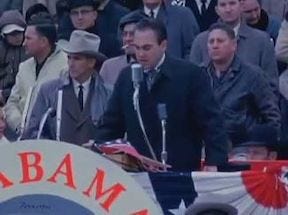
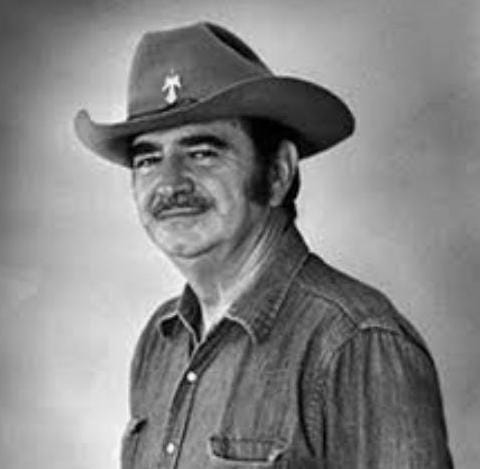
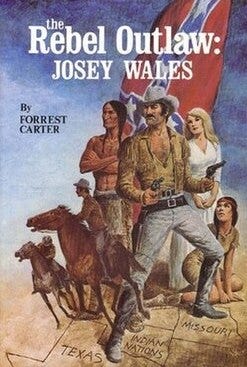
A very odd statement to make: " 'This was written by a crude fascist.' It was nutty. The man's hatred of government was insane." Fascists LOVE the power strings of government. So do Communists. That's why it is so difficult to figure out what kind of beasts have been running our gov for the last few decades.
Why did you leave out that they were all Democrats - the party of identity politics continues to be the party of identity politics!